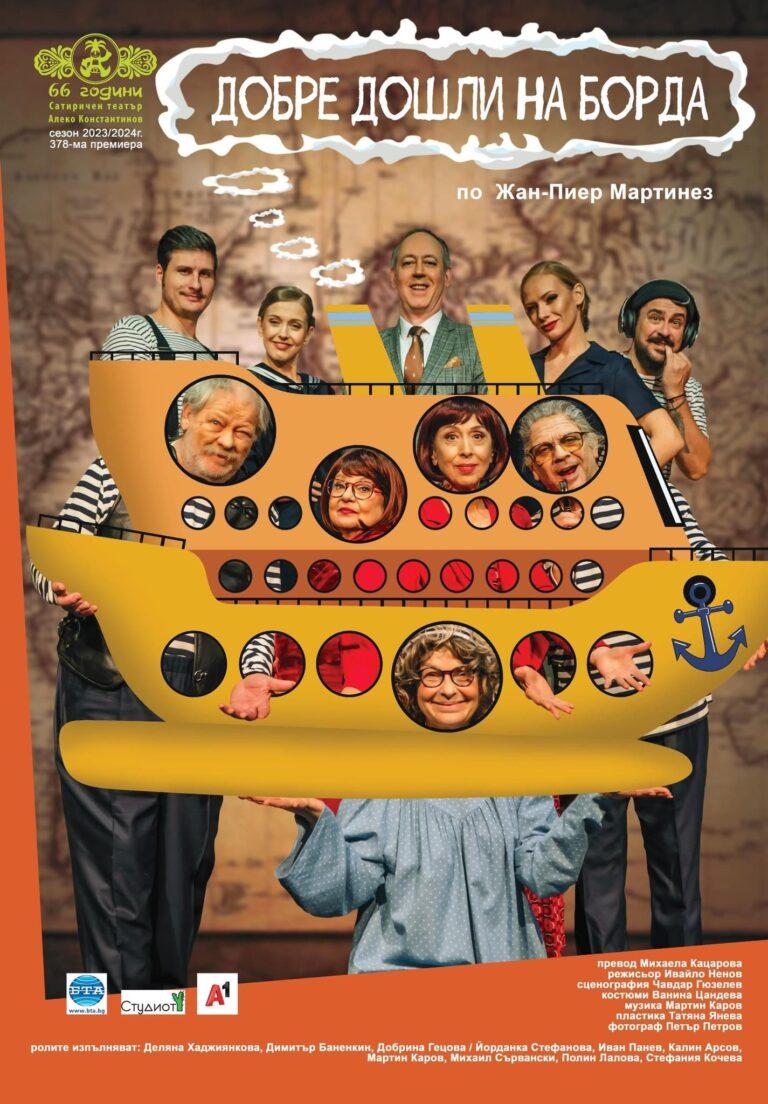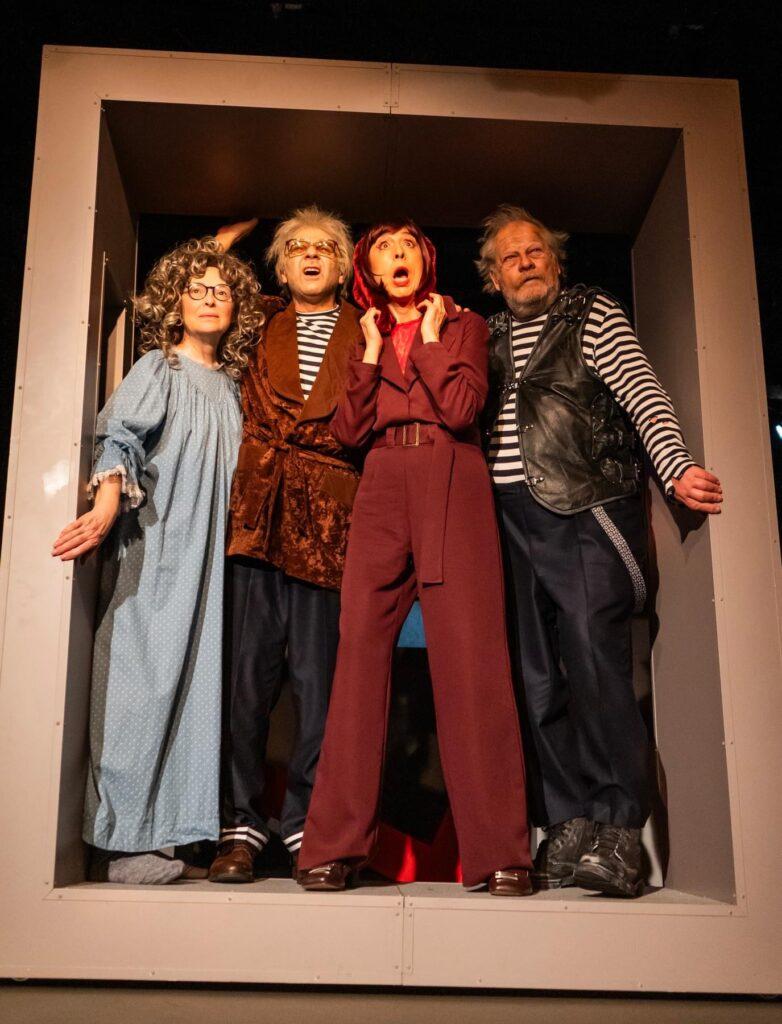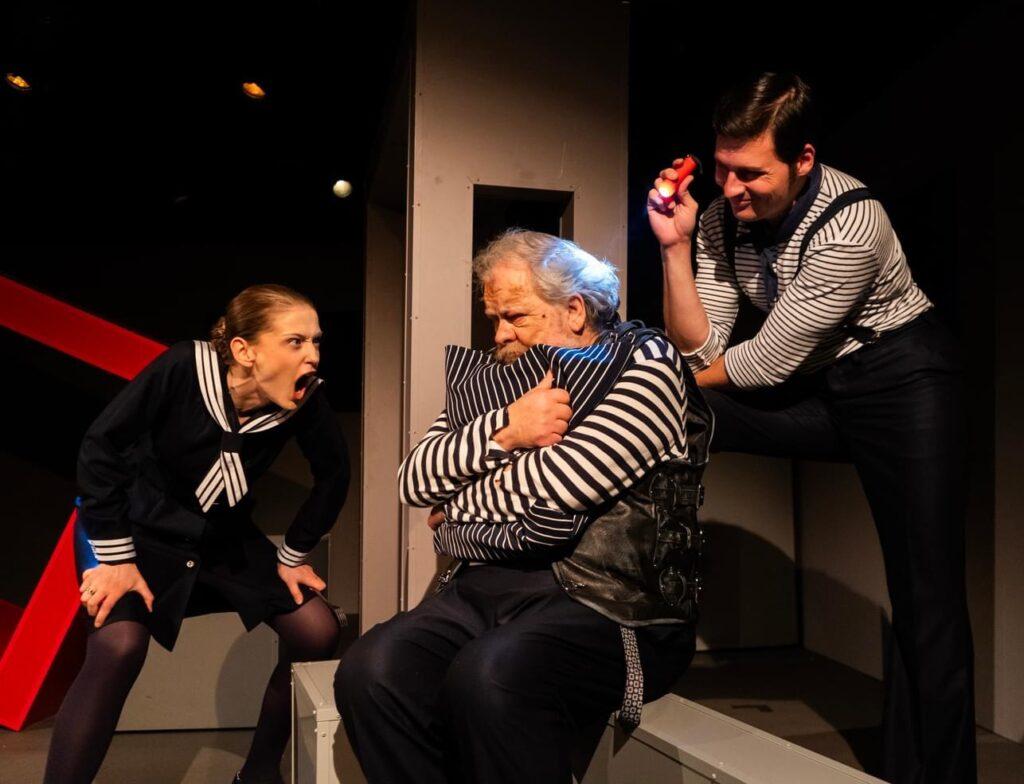Première en février 2024. Théâtre satirique Aleko Konstantinov de Sofia (Bulgarie)

Добре дошли на борда (Welcome aboard)
A play by Jean-Pierre Martinez
translated by Michaela Katsarova
directed by Ivaylo Nenov
set design by Chavdar Gyuzelev
costumes by Vanina Tsandeva
music by Martin Karov
choreography by Tatyana Yaneva
With : Pauline Lalova, Mihail Sarvanski, Ivan Panev, Stefania Kocheva, Dobrina Getsova/Yordanka Stefanova, Dimitar Banenkin, Delyana Hadjiyankova, Kalin Arsov
Dramaturg : Bogdana Kosturkova,
Assistant Directors : Emilia Krajcheva et Tsvetelina Simeonova,
Photographer : Petar Petrov
Press Review
"Welcome on board" at the Satirical Theater : Inspired on stage, different generations play in the troupe.
Svetlomira DIMITROVA, VTK, 17th of February 2024

Undoubtedly, in recent years, the Satirical Theater stands out not only as the most productive but also with reverence for valuable dramaturgy, word, and stage speech. In the ensemble, already established actors and directors continuously infuse fresh blood and energy with young talents. This is precisely what comes to mind after another premiere of “Welcome on Board” by Jean-Pierre Martinez.
The play introduces us to a nursing home with residents at the age of 100, at the end of their lives, having accepted the banality of existence. The care of the ambitious director is to fight for stars in the prestigious “Golden Quill” award. And for the medical nurse, sexy and a fan of modern understanding of a healthy lifestyle, to maintain order with humor. The doctor is Italian, torn between two, one mistress, the other fiancée, who has language problems and has forgotten much of medical science.
Reconciled with their existence in the pension are Captain – a former military man with a high opinion of himself, Harriet – a demented grandmother who “turns on” when no one expects it, and the harmless Harry, curious about the lives of others. This is how everyday life in the home looks until Blanch enters. The former actress, much younger than the others, brings the spirit of freedom and independence after tormenting her son and daughter-in-law with her whims. Against this background, the suspicion arises that the lady whose place Blanch has taken in the home has been murdered… Added to this is the suspicion that one of the women on staff is pregnant. So entangled, the intrigue gives the actors the opportunity to use all their abilities in the comedy of the situation. And it would have remained there if it weren’t for Blanch’s dream of going on a cruise to Antarctica, infecting all the residents of the home with it.
With sparkling energy “on board” are the actors Polina Lalova, Mikhail Sirvanski, Ivan Panev, Stefania Kocheva, Dobrina Getsova/Yordanka Stefanova, Dimitar Banenkin, Delyana Hadzhiyankova, Kalin Arsov. “Off the board,” but without whom the performance would not exist, are playwright Bogdana Kosturkova, director Ivaylo Nenov, translator Michaela Katsarova, set designer Chavdar Gyuzelev, and costume designer Vanina Tsandeva. Once again, the author of the music for the Satire play is the actor from the troupe, Martin Karov.

"Welcome on board" to life
Nikolina Deleva in Kultura, 12th of February, 2024
The latest premiere at the Satirical Theater is the comedy “Welcome on Board” by the French playwright Jean-Pierre Martinez, loaded with black humor, satire, and sarcasm.
Funny situations, puns, and ambiguous lines are a way to express important truths about old age and death that nobody wants to talk about. Ivaylo Nenov is an actor and director, winner of the Slavi Shkarov Award for Best Young Theatrical Director in 2019 and the Young Hope Award at the “Golden Kukerikon” in 2020. The director and actors approached the dramatic text with creative freedom, adding their improvisations that enrich and make it even more colorful and funny. Each develops an individualized character, giving it distinctiveness through gait, speech, gestures, and intonation. This enhances the comedic effect without compromising the authenticity and organic nature of the characters. All are united in a single ensemble, and the pleasure with which they play and partner on stage is palpable.
Christian (Ivan Panev) – the son of 86-year-old former actress Blanch (Yordanka Stefanova), tries at all costs to get rid of her, as if she is a “domestic pet that he must leave in a shelter before going on vacation.” It is her turn on the waiting list for the nursing home after one of the residents – Delia, passed away the previous night. The so-called “assisted living home” is practically a “assisted dying home”: “bright and warm like Hades,” a civilized Purgatory with residents waiting for the afterlife. In the spirit of Catholic strictness, the director (Polina Lalova) and the nurse (Stefania Kocheva) are dressed in black, evoking funeral thoughts despite their forced friendliness and wide smiles.
The home is the last haven for the elderly who have ended up “beyond the board” of life – discarded and isolated so as not to disturb the others, reminding them of old age and death. Harriet (Delyana Hadzhiyankova) is a sweet old lady with dementia and selective deafness, knitting a scarf as sturdy as a murder weapon. She remembers the sinking of the “Titanic,” although she mixes up the names of the musicians from its orchestra with those of the singers from the “Beatles,” probably a fleeting memory from her youth. Reggie (Kalin Arsov) is a reconciled old man – tattered and with loose suspenders, embracing a pillow for comfort, like little children do. The most well-preserved is Captain Harold (Dimitar Banenkin) – a former military man with an aristocratic streak, trembling from Parkinson’s and sleeping like a baby. Despite his advanced age and long tenure as a retiree, he is still a playboy and a gentleman with the ladies. The elderly have come to terms with being unnecessary remnants – “cars that have rolled their mileage,” in Harriet’s words. Their hope is that someday scientists will make immortality possible by injecting people with cells from the recently discovered immortal jellyfish.
The newcomer, Blanch, is a real “thorn in the side” and has already been expelled from a series of nursing homes, the last of which she even staged a fire. She is inventive and sarcastic – playing with words, it’s unclear when she’s serious and when she’s joking. Her arrival disrupts the barracks-like rhythm of elderly everyday life, structured around breakfast, lunch, afternoon nap, tea, and dinner.
The seniors find a positive pregnancy test in the living room, and suspicions about its origin are directed towards the love triangle: the Italian doctor – the macho Roberto (Mikhail Sirvanski), his future fiancée – the director Natalie, and his secret lover – the nurse Caroline. The situation is complicated by the evidence pointing to the violent death of Delia, killed by Harriet for the captain’s seat at the table. The director and the doctor will cover up her crime to avoid losing the “Golden Quill” awards and the star for having the nursing home with the most centenarians. Their future marriage is also a business partnership under the motto: “You watch them – I’ll fix them”: she watches the seniors, he promotes them to his private clinic.
A series of comic situations ensue – a quiet war between the residents of the home, their scheduled and habitual relationships, the repetitive daily routine devoid of joy and human interaction, only boredom, the smell of stagnation, and the inevitable frozen spaghetti in the dining room. Their dementia does them a favor, erasing what they don’t want to see and remember.
Unlike the others, Blanch has not lost her zest for life – she is a rebel who wants to live at her own pace and enjoy life: dreaming of travels and freedom, dry martinis in chilled glasses, bathing in a tub, restaurants, and glamour. She escapes from the reality of old age through fantasy, lying to the others that she won a quiz in the elderly magazine – a cruise to Antarctica. Even there, it is better than the nursing home – cards and desolation, on which to write the new page of her life. Awakening dreams makes the seniors alive again – it puts them “on board” the ship, even an imaginary one, that will bring them back to life and remind them what it’s like to be young and not alone. The scene where each of them shares their most intimate desires from the proscenium is very powerful and genuine with its warmth and humanity. The residents of the home are no longer lonely hermits but part of the crew of dreams.
The set design of the performance (Chavdar Gyuzelov) is abstract and graphic, functional and combinative – creating lines, cubic elements that, through movement and transformation, reshape the stage, intertwining a real and fantastical space – the interior of the nursing home becomes the imaginary ship heading to Antarctica. The dual function of the stage box – simultaneously a home and a ship, is emphasized by the round ship-like windows on the walls. The stage space is divided by elements in gray, at the center of which is a bright red rectangle framing the center – a symbolic allusion to the grayness of old age and the pulsating red color of irrepressible vitality. The stage design does not distract attention but serves as a frame that highlights the performance of the actors – the streamlined forms without details direct the gaze towards them. The rectangles of the set are a metaphor for the residents, confined in the boxes of a prison created by their frail bodies, and the space of their final haven. The stage elements are like parts of a children’s construction set, with which different realities can be created – the inclined red rectangle depicting the shipwreck, in the final scene, is now upright and with everyone “on board.”
The performance is well-paced, mastering the audience’s attention and emotions at every moment. Genuine laughter triumphs over sadness, and the ending is optimistic – the cycle of life continues, and Christian’s grandson is the newest member, welcomed by the crew with a “Welcome on board.” It turns out that the intended pregnancy test belongs to Christian’s wife.
Dreams and imagination create worlds and bridges between the stage and the audience. The spectators are also passengers on this ship, which takes each one to the sunset of their life. Sometimes the best weapon against the fear of the inevitable end of the human tragicomedy called “Life” is laughter, and spirit and dreams are the magic that overcomes the limitations of flesh, time, and space, expanding life beyond the boxes of everyday existence.

"Welcome aboard as captains, not as shipwreck survivors. The direction is clear – the final harbor is old age, but at least let's enjoy the scenery along the way."
Segabg.com 24th of Februay 2024, Irina Gigova.
“When you are born, you are already on board. On board that symbolic ship, which, passing by more or less attractive landscapes, invariably journeys towards the sunset of days. For the fortunate ones, it may dock at a cozy nursing home in London like the ‘Last Harbor,’ where residents are provided with healthful aging and comfortable vegetation. But how long will that be enough for them?…
The case of old age as our inevitable future, the expiration date of dreams, and the strength of the spirit that overcomes the shortcomings of physical wear and tear are cleverly and wittily presented in the premiere play at the Satirical Theater ‘Welcome Aboard’ based on the play by perhaps the most prominent contemporary French playwright, Jean-Pierre Martinez. The director is Ivaylo Nenov, whom we remember from another hit on the Satire’s bill – ‘Five Times for One Night’ by Chiara Atik.
In ‘Welcome Aboard,’ the predictable everyday life of the residents of the centenarian institution is happily disrupted by the arrival of a new pensioner (Yordanka Stefanova), brought in a hurry by her aging son (Ivan Panev). The former actress Blanche (Dubois?!), expelled from several similar homes due to rebellious behavior, including arson, first shocks, and then, more quickly or slowly, wins the hearts of the touching residents and catalyzes their relationships: Captain with undying gentlemanly instincts, albeit with Parkinson’s (Dimitar Banenkin), selectively hearing and understanding, already demented Harriet (a virtuoso transformation by Delyana Khadzhiyanakova), the reconciled with age and health problems Reggie (guest actor Kalin Arsov). Yordanka Stefanova is interesting and different from her own stereotypes in the role; it is certain that the excellent Dobrina Getsova, with whom they alternate in the role, has built an equally challenging character.
The abundance of typical situation clichés – a criminal subplot related to suspicions of the murder of a previous resident, a love triangle among the staff – the owner, the Italian doctor, and the sexy nurse (Polin Lalova, Mikhail Sarvanski, Stefaniya Kocheva), mysteriously introduced positive pregnancy test – are just technical details. From afar, they may seem to parody great works (‘One Flew Over the Cuckoo’s Nest,’ for example), but starting as if from nothing and ending nowhere (underdeveloped, untold, unpunished), they are rather crutches for the main intrigue.
Namely: the eccentric Blanche – whether out of boredom or a good heart, lies to her fellow residents that she has won a cruise to Antarctica with her answers in a quiz in a pensioner’s magazine. And she will choose a companion after each of them shares their yearnings and dreams. This turns out to be enough to motivate the old people, to give them emotion, purpose, and meaning in their daily lives. The scene where they articulately express their dreams together, spurring on the imaginary ship, is simply iconic. The set by Chavdar Gyuzelev – abstract, cubistic, at this moment unfolds its full meaning. Because everything actually happens in the conditional space of human imagination. And it is sometimes much more genuine and alive than any specific everyday reality.
The translation of the play from French is by Michaela Katsarova. The music in the performance is by Martin Karov, the choreography – by Tatyana Yaneva, and the costumes – by Vanina Tsandeva.”
Welcome on board
Pauliana Novakova, dans Obache – 14 février 202
The Satirical Theatre presents another challenging, absurdly humorous, and lively play about old age and death. It has a certain French elegance, after all, with Jean-Pierre Martinez as the author.
In fact, we are all on board; we just don’t know it. When we are young, we think we are immortal, everything is ahead of us, and anything is possible. However, the ship of life gradually moves us through time, and we unwittingly find ourselves seemingly off-board, unnecessary to the world, bothering and hindering those around us with our ailments, whims, and increasing needs for care and attention. Gradually, we forget our dreams. Are we really like this, or are we not, and what does it take to stay on board until the end of this life, despite everything that happens to us, and not give up living it?
The play turns upside down all the clichés traditionally associated with the theme of the Nursing Home. Relatives in a hurry to get rid of their annoying ex-actress mother (is there an ex?), a gray, stuffy atmosphere permeated with the smell of stale food, a nurse with the appearance of a camp supervisor ready to administer a sedative injection and put a calming jacket on anyone who disrupts the burdensome monotonous routine in the dormitory: “get up, eat, lie down, sleep.” This regime ensures the deepening of the physical and mental degradation of the abandoned patients, leading to complete amnesia, complete immobilization, and voluntary surrender to the arms of death. In such a seemingly environment, we meet characters who seem to have embarked on this path, although the colorful marks of their past lives have left imprints on their consciousness and behavior: Harriet (Delyana Hadzhiyankova), a very charming old lady who hasn’t lost her feminine charm, whose dementia connects memories of a hippie past and The Beatles with the sinking of the Titanic; Reggie (Kalin Arsov), unlocking childlike innocence in the face of the fear of the unknown; Harold (Dimitar Banenkin), a former military man who, despite Parkinson’s, has retained his aristocratic spirit as a gallant officer.
The administrative staff, Director Natalie (Polina Lalova), Dr. Roberto (Mikhail Sarvanski), Nurse Caroline (Stefaniya Kocheva), strictly adhere to the imposed Catholic dogmas, trying to win the “Golden Chin” award, hoping for funding. But don’t be fooled by associations with “One Flew Over the Cuckoo’s Nest.” The characters are not insensitive, and they have their very human passions: Roberto will marry Polina but has a love affair with Nurse Caroline. If a positive pregnancy test of unknown origin appears, the story becomes criminal, and we have a murder to solve, which unfolds unexpectedly, and the sentence for the murderer ultimately becomes justified.
Everything gets mixed up, or rather falls into place with the arrival of Blanche (Yordanka Stefanova / Dobrina Getsova), brought by her indecisive, stressed son (Ivan Panev). Blanche, of course, does not accept age as her problem. “Age is irrelevant unless it’s cheese,” she says, smoking a cigarette, wishing for a cocktail, and instantly attracting male attention and female jealousy. Expelled from several similar dormitories for unconventional behavior, she ignites the situation here as well. She suggests an imaginary journey to Antarctica because everything is white and clean there, actually hinting at the possibility of a new beginning. And for each of the others to have the happiness to go with her, they must reveal their hidden dreams. Thus, by awakening desire and hopes, she actually returns everyone on board to conscious existence. A stellar moment in the performance, where each actor brilliantly reveals the best of themselves, thrilling and touching the audience.
We won’t reveal everything – we won’t disclose who the murderer is, whether the elderly embark on a journey, what happens with the love triangle, and to whom the positive pregnancy test belongs.
We’ll just say that, in the end, the baby appears as a result of the pregnancy test. A wrinkled little human being that looks more like an old man – after all, aren’t babies like that, whose time travel is yet to come.
Harmony, warmth, and humanity flow from the stage between the old and the young, because, in the end, we are all on board.
The play is another excellent addition to the repertoire of the Satirical Theatre. Dramaturg: Bogdana Kosturkova
Director Ivaylo Nenov has created a dynamic, accent-rich performance. The set design by Chavdar Gyuzelov is functional, clean, and symbolic; it simply participates in the performance, and the music by Martin Karov is in dialogue with the action.
The actors are impressive with their resourcefulness and interpretive abilities. Tatiana Yaneva has also worked on the movement because it is not easy to imagine how someone suffering from Parkinson’s but not losing their dignity can court a charming lady with a bouquet of flowers. And Michael Sarvanski’s find – Roberto, who cannot hide his passionate nature, is Italian and continuously mixes up the vocabulary, I have no words.
Cheers to the play!
TV Report by BTA (Bulgarian News Agency)
“The drama is best felt after you’ve laughed heartily,” says director Ivaylo Nenov in an interview with BTA.
The drama is best felt after hearty laughter. In “Welcome Aboard,” there is a very serious underlying theme that runs throughout – and that is the passage of time. This was stated by director Ivaylo Nenov on the occasion of the premiere of Jean-Pierre Martinez’s play at the Satirical Theater, as reported by BTA.
“The text itself was a reason for theater. I liked the situation of the nursing home, and it offers a great field for theatricality,” adds Nenov. “From the very beginning, we decided the play to be absurd. This is the code that solves the whole play. Through absurdity, we emphasize time, space, what people are like, how bad it is when a person ages, and how they stop dreaming,” adds actor Dimitar Banenkin. According to him, spirit is the most important thing in the body of a person.
Everyone should have the freedom to dream because dreams are what make us alive and keep us moving forward, says actress Polin Lalova. According to her colleague Kalin Arsov, age matters when a person voluntarily gives up the desire to live because “old age is not for the fearful.”
The roles are also played by Delyana Khadzhiankova, Dobrina Getsova/Yordanka Stefanova, Ivan Panev, Mikhail Sirvanski, Stefania Kocheva. The translation is by Michaela Katsarova. The scenography is by Chavdar Gyuzelov, the costumes are by Vanina Tsandeva, the music is by Martin Karov. Assistant directors are Emiliya Kraycheva and Iva Stancheva. The dramaturge is Bogdana Kosturkova.
Director Ivaylo Nenov and actors Dimitar Banenkin, Kalin Arsov, and Polin Lalova talk to BTA’s Daniel Dimitrov: What are the surprises in this comedy by Jean-Pierre Martinez? What code solves the whole play? Are there people who should be forbidden to dream? When does age matter if we accept that the leitmotif of “Welcome Aboard” is that age is irrelevant? What does the rebellion of old age look like? Who is left outside the board?
Is there a surprise in this comedy by Jean-Pierre Martinez?
Ivaylo Nenov: Yes, there is definitely a surprise. The text itself was a reason for theater. I liked the situation of the nursing home, and it offers a great field for theatricality, and the theme – about the passage of time. We can confidently say that it has its dramatic notes, but comedy is at the forefront. In fact, the drama is best felt after hearty laughter. There is indeed a very serious underlying theme that runs throughout – and that is the passage of time, slipping through our fingers. This is felt in the scenography itself – by Chavdar Gyuzelov, and in the musical environment – by Martin Karov, to whom I express special thanks – for all the creativity, for all the energy he brought to the process.
Dimitar Banenkin: The surprise is that from the very beginning, we decided the play to be absurd. This is the code that solves the whole play. Through absurdity, we emphasize time, space, what people are like, how bad it is when a person ages, and how they stop dreaming. We highlight how important it is for some people in the nursing home, where time seems to have stopped for them, and each of them dreams of something… In a very homogeneous way, we managed to achieve this whole mixture that director Ivaylo Nenov demanded from us.
Polin Lalova: The surprise is the criminal plot, which in itself implies a surprise. I am the content provider of this assisted living home, where the action takes place. And accordingly, the revelation of the plot regarding the crime leads to a surprise for the audience itself. Because we are constantly searching for who committed a crime.
Kalin Arsov: There must be a surprise, as it is required by the genre. After all, this is a dark comedy. There must be a surprise, suspense, horror (Laughs).
Are there people who should be forbidden to dream?
Kalin Arsov: In no way. Everyone has the right to dream and hope.
Dimitar Banenkin: This is something very personal. Even in the play, I quote the words of my friend Elin Rakhnev, who told me: “My friend, the moment you stop dreaming, means you’re dead.” So dreams never stop.
Ivaylo Nenov: We even provide the only possible remedy for this passing time, and that is dreams. Everyone should be able to dream. Dreams are what give meaning to our time. As Antoine de Saint-Exupéry says, to build a ship, don’t give people wood, don’t make them work, but make them dream of the endless sea…
Polin Lalova: Every person should have the freedom to dream because dreams are what make us alive and keep us moving forward.
When does age matter?
Dimitar Banenkin: Age only matters in the moment when your spirit gives up. I, for example, am 60, but my spirit is still 20. I suppose it’s the same with elderly people. So the spirit is the most important thing in a person’s body.
Ivaylo Nenov: In the play, there are both young and elderly residents of the nursing home, and the staff. Both generations kind of live carelessly, wasting their time in different ways. And the entrance of one character turns out to be the colorful spot in the gray everyday life, pushes things and manages to make the elderly realize how they should live their days meaningfully.
Polin Lalova: In my opinion, age really never matters because dreams are what give us wings, and they help us overcome age. It doesn’t matter if we are 9 or 99, we can always dream of something and strive for it.
Kalin Arsov: In principle, age matters when a person voluntarily gives up the desire to live. Old age is not for the fearful.
What does the rebellion of old age look like?
Dimitar Banenkin: Does it even exist?… I think rebellion is about overcoming yourself, always being able to prove yourself…
Kalin Arsov: The rebellion of old age is in dreams – when you allow yourself to dream, even if you are in the borderline age.
Polin Lalova: From my point of view, old age looks like a very cozy and pleasant place, seeing what happens here, in our home. It’s very interesting because our elderly characters face interesting challenges. And that makes old age interesting…
Ivaylo Nenov: Through dreams, the rebellion of old age is absolutely legitimate at any age, and it is – to be able to afford. To be able to afford to live dignified and the way you want. To be able to believe. As a nation in Bulgaria, at the moment, we need to be able to dream more. We have slowed down a bit in dreaming. And to dream, you need to set goals. Things are connected… As a nation, we need some new goal to dream about – to unite and move forward. That’s the big model. And I think it is present in the performance if I can make a distant comparison… I’ll quote a sentence from “Welcome Aboard.” It’s not from the play, but it’s in our performance, and it goes like this: life is like a long rope that you can either wrap around your neck until you hang yourself. But you can also hang it at the top of the tower and descend on it, go wherever your eyes see. For example, to Antarctica…
It sounds a bit like making lemonade…
Ivaylo Nenov: Yes, absolutely, when life gives you lemons, make lemonade…
Who is left outside the board? Who is not welcome there?
Dimitar Banenkin: There are no people who are not welcome on board. Everyone is welcome, who still dreams, has hope, and wants to achieve something, regardless of age.
Ivaylo Nenov: Those outside the board are those who fail and do not know how to live life the way they want.
Polin Lalova: Everyone who does not allow themselves the freedom to dream remains outside the board. Otherwise, everyone is welcome on board.
Kalin Arsov: The gray people remain outside, those who let everyday life pull them and make no effort to dream and enjoy…
Daniel Dimitrov, BTA
Sofia, 9th of Frebruay 2024
Interviews Kultura.bg on National Bulgarian Television

“Tonight is the preview, and tomorrow is the premiere of ‘Welcome Aboard’ by Jean-Pierre Martinez at the Satirical Theater. The play was presented on Culture.BG by director Ivaylo Nenov and actors Dobrina Getsova, Yordanka Stefanova, and Mikhail Sarvanski.”
Link to the website
Morning television show „На кафе”.
Delyana Hadjiankova about the play ‘Welcome Aboard’ – ‘At the Café’ (20.02.2024)
Interview with the director on the Bulgarian National Radio
Nadia Atanasova interviewed director Ivaylo Nenov, from whom you can learn more about the retirement home and the challenges of the acting profession
Link to the BNR website
Interview of Stefania Kocheva on the Nova Television
8 of March 2024, Emission “For the Coffee”
Link to the website
A comedic panoptic view of centenarians in “Welcome Aboard”, Dimitar Staykov, 24 hours (24 Chasa), 15/02/2024
